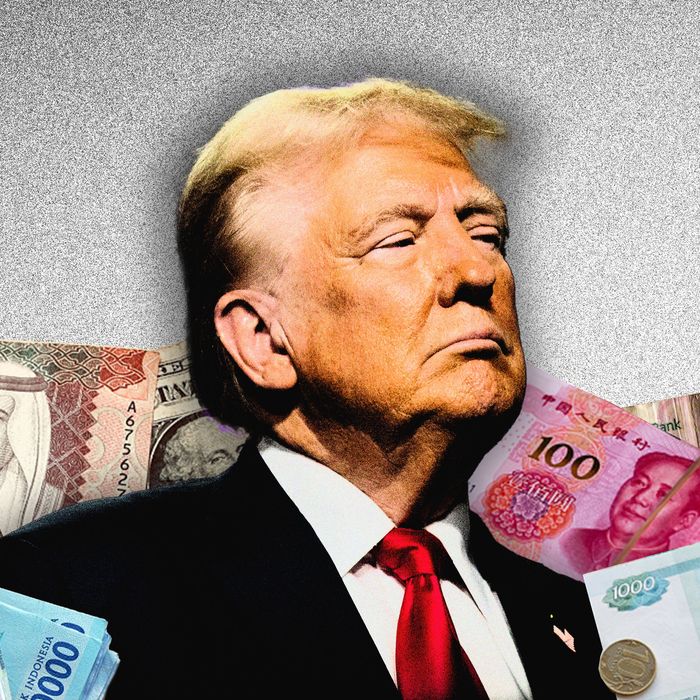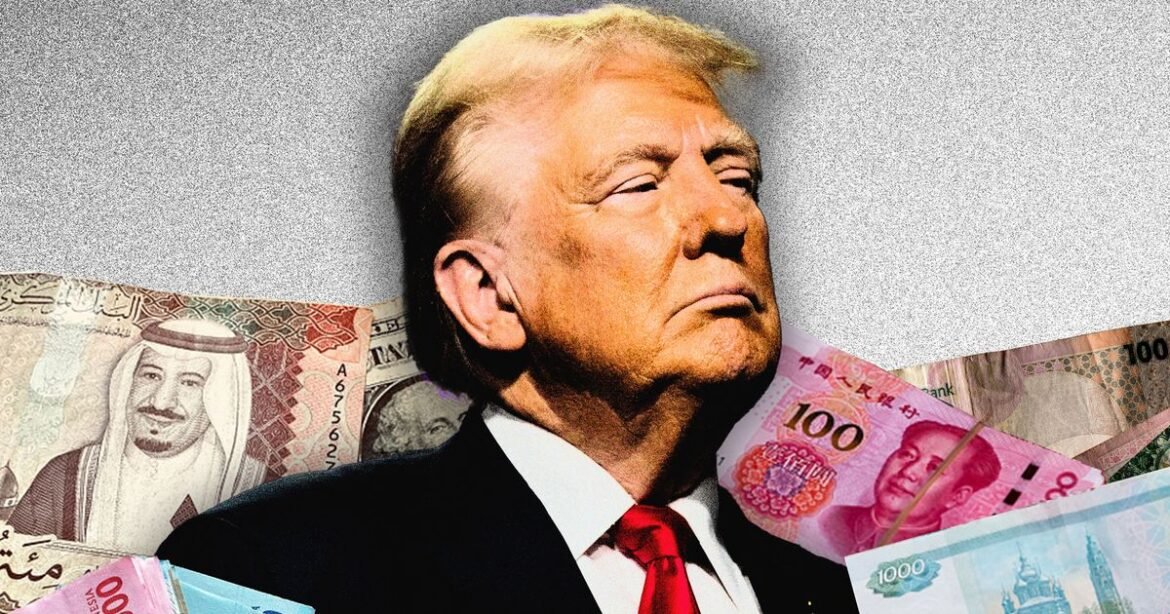
Photo-Illustration: Intelligencer; Photos: Getty Images
When Donald Trump launched his first presidential campaign nearly a decade ago, there was a deluge of concerns about his foreign financial entanglements. And rightfully so. Given the financial overlap between Trump, his family, his company, and a constellation of kleptocratic regimes, especially Russia, Trump presented an unprecedented opportunity for foreign regimes to directly access the White House and tilt American policy in the process.
Now, with Trump running for the presidency once more, those concerns have hardly disappeared. If anything, foreign governments — including brand-new regimes that weren’t involved in Trump’s first whirlwind in the White House — have only spied new opportunities to burrow into his pockets and into a second administration.
Many of these networks are already known, if forgotten. Trump’s financial links with regimes in places like China, Kazakhstan, or Indonesia were already reported in detail during his presidency. Even after Trump left the Oval Office, the revelations about his subterranean financial links as president with foreign regimes continued spilling out; it was only this year, for instance, that congressional investigators revealed that the first two years of Trump’s presidency included countries as far afield as Qatar, Kuwait, Turkey, and many more patronizing Trump businesses. Any of these details on their own would be exceptional — can you imagine how much any other presidential candidate’s secret Chinese bank account would dominate a news cycle? — but they’ve been subsumed in the broader morass of Trump’s scandals. They’ve become, to an almost shocking degree, normalized.
Look at Saudi Arabia. Years after Saudi tyrant Mohammed bin Salman (MBS) ordered the grisly killing of journalist Jamal Khashoggi, the Saudi government has used an entire fleet of PR professionals and consultancy firms to launder its image, transforming the regime from a bastion of backwardness into one of progress and reform. (Saudi Arabia under MBS “almost feels like a start-up,” WeWork founder Adam Neumann purred last year at a Saudi-sponsored conference.) And part of that influence campaign has directly targeted — and directly used — Trump. Just last month, the New York Times revealed that the Trump Organization had inked a brand-new deal in the country, centered on Trump branding a new high-rise in Jeddah. The branding deal mirrors similar arrangements Trump has signed with foreign partners elsewhere, lending his name to developments in Azerbaijan and Panama. It’s unclear how much the new Saudi deal is worth, but as the Times noted, “Saudi Arabia has become one of the few reliable sources of growth for the Trump family’s business operations.”
Yet the deepening links between Trump and Riyadh don’t revolve only around a single, luxe new high-rise. Time and again in recent years, Saudi and its proxies have bankrolled Trump and his inner circle — and even expanded the network of authoritarian allies succoring Trump. For instance, a Saudi construction company recently helped Trump sign a separate deal in the dictatorship in Oman, where migrant laborers are currently building out yet another luxury building, including a hotel and golf course. We know a few more details on this new arrangement, such as the fact that the Trump Organization has already banked at least $5 million from the deal. As the organization itself revealed, the total compound will have a “combined value of $200 million” — and will, naturally, “represent an unprecedented level of luxury,” which is why sales agents are “targeting superrich buyers from around the world, including from Russia, Iran and India,” per the Times.
Again, any one of these deals would be a breathtaking breach of previous norms for a president. But the new links between Saudi and Trump go even deeper, stretching into Saudi Arabia’s latest foray into foreign investments: golf. Throwing billions of dollars into professional golf — all as a way of transforming Riyadh into a destination of global sports — Saudi backed the recent creation of LIV Golf, the rising competitor to PGA Golf. One of the kingdom’s key partners in the new league? Trump, naturally. In early 2024, Riyadh tapped Trump to host LIV Golf tournaments at his own courses — making it “another major source of new revenue for the Trump family.”
Indeed, calling all of these Saudi arrangements a major inflow for the Trump brood is an understatement. In one of the most sordid — or swampiest — arrangements seen since Trump departed the White House, Trump’s underqualified, underexperienced son-in-law, Jared Kushner, managed to land a $2 billion investment from the Saudis for his brand-new investment firm. Even Saudi officials were at first spooked by the deal, shying away from Kushner’s initial proposal. But as the Intercept reported, after officials recommended against the investment, MBS himself stepped in to approve the deal, keen to sink Saudi Arabia’s financial claws into Trump’s family that much further.
If anything, it’s Kushner who’s taken the lead on threading nascent links between the world of Trump and new strongmen suitors. In addition to his Saudi lucre, Kushner has recently been gallivanting around the Balkans, where he signed a new agreement earlier this year with the authoritarian regime in Serbia to land a luxury-hotel lease. The arrangement builds on years of Trump World cozying up with Serbia’s budding autocrat, Aleksandar Vucic; not only did Trump welcome lobbyists for Bosnia’s pro-Serbian separatists into his administration, but Trump’s former acting director of national intelligence, Ric Grenell, has become tight with Vucic, with the Serbian leader recently awarding Grenell with what the latter referred to as Serbia’s “highest honor.”
These are just the deals that we know about; given the financial opacity of everything from the American real-estate industry to things like the investment funds Kushner oversees — areas that Biden’s Treasury Department is specifically targeting for increased transparency, thankfully — it’s entirely possible that there’s a world of additional investments, purchases, and arrangements that we still don’t know about and that we’ll only learn about in years to come. This is, of course, an issue that is far broader than Trump or his inner circle — but given that Trump is a coin flip from the presidency, his sudden proximity to power is that much more reason a whole range of long-overdue counter-kleptocracy reforms must finally be passed by Congress.
If you need any more proof, just look at what we learned earlier this month. A bombshell exposé in the Washington Post revealed that the military dictatorship in Egypt may have secretly funneled some $10 million into Trump’s flagging 2016 campaign, without the American public having any idea. The Post’s details had all the makings for a scandal of historic proportions: The Egyptian security services suddenly pulling $10 million in cash from an Egyptian bank; classified intel indicating that Egypt’s ruling despot wanted to funnel $10 million to Trump; Trump himself announcing a surprise injection of $10 million into his campaign, tapping what he claimed was his own money. There was so much smoke you could choke on it. (All of this came alongside Egypt’s successful campaign to flip Senator Bob Menendez into its own foreign agent, a case you can read about in my new book, Foreign Agents.)
And yet, after Trump became president, his administration eventually dropped the investigation into the Egypt-to-Trump pipeline wholesale — and Americans never learned where that Egyptian money may have ended up, or what effect that might have had on Trump’s policies. Americans are still, to this day, in the dark about the links between Trump and Egypt.
That’s just one investigation, and one financial link, among dozens and dozens more, some of which we still know next to nothing about. But if past is precedent, that may simply be a taste of what’s to come — and what is at stake, for both dictators and democracy alike.

